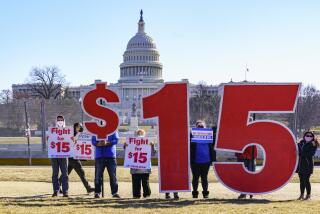Better Than Graft
- Share via
The implicit deal that had been struck to raise congressional and other top federal salaries seems to be in some danger of dissolving under a shower of cold political sweat. Until this week it was expected that the Senate would vote on and reject the pay raises that had been recommended last year by a special commission and endorsed by President Ronald Reagan. The House, though, would delay its vote until after Feb. 8, when the pay increases automatically are to take effect in the absence of vetoes by both chambers. But now, shaken by public opposition to the salary increases, a lot of representatives are having scared second thoughts. It would be too bad if those fears led to the loss of the pay boosts. Top federal officials deserve increases. And the American people deserve a Congress that will no longer have an excuse to go on taking payola from special-interest groups.
Public antipathy to the pay proposal--85% oppose it, according to a recent Wall Street Journal/NBC News poll--is understandable. The 50% salary increase would raise congressional pay from $89,500 to $135,000 a year. Cabinet secretaries, meanwhile, would go to $155,000, Supreme Court justices would be paid $165,000 ($175,000 for the chief justice), federal district judges would earn $135,000. This is handsome remuneration, no doubt about it. At $135,000, members of Congress would be in the top 2% or 3% of all wage earners, making more than four times the median family income. Americans who look just at those numbers aren’t likely to be impressed by the argument that those who serve in Congress must bear unusual expenses, including keeping two homes.
What, then, justifies the proposed pay increases? The first thing is equity; in the last 20 years the real buying power of top federal salaries has fallen by about 35%. Pay raises to levels that are more realistic and more suitable to the importance of the work involved are long overdue. Even more pressing in the case of Congress is the chance --in fact, the imperative--to end the scandal that lets senators and representatives rent themselves out to lobbying and other interest groups. The so-called honorariums that they collect--worth $10 million or more a year--currently let House members get up to $26,000 in extra income, and senators $35,000. Only the most cynical or naive would maintain that these payments don’t influence legislation and votes.
Once the pay raise took effect, Congress, under the prod of public scrutiny, would be expected quickly to end this corruption by enacting a ban on outside income--not just payments for speeches and appearances but professional fees and money from directorships as well. In short, or so reform advocates insist, no more payoffs, no more conflicts of interest, no more legalized corruption. The chance of getting a more selfless, more honest Congress doesn’t come along every day. The pay raise would put that chance within reach.
More to Read
Get the L.A. Times Politics newsletter
Deeply reported insights into legislation, politics and policy from Sacramento, Washington and beyond. In your inbox twice per week.
You may occasionally receive promotional content from the Los Angeles Times.










